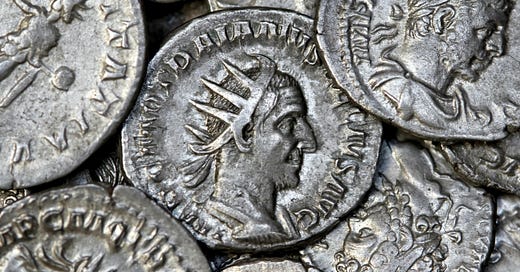An Update About Things Above
Good morning! It’s been a while. I’ve still been writing every day, but for the past several months my focus has shifted to songwriting and letters of encouragement. I hope to share those things with you soon.
My intent with Things Above is that the topics and publication schedule are subject to the Lord’s will. I try to only publish something if I feel led to do so by the Holy Spirit. For a long season that meant posting an article every week. More recently I’ve been in a season during which I was still writing, but I didn’t feel released to publish what I wrote.
There are so many things I want to share with you. God has been teaching me how to deal with blame, how to focus on Christ in hard times, and how to joyfully serve in the roles He has prepared for us. He has taught me more about selflessness and compassion than I ever expected to learn, and I know He’s just getting started.
My sincere prayer is to share all of that with you soon. With His blessing, I will share as He leads. In the meantime, I feel released to offer some short observations about two verses that are sometimes misunderstood.
Render Unto Caesar
The first is the concept of rendering unto Caesar. This account appears in Matthew 22, Mark 12, and Luke 20. For simplicity’s sake, we’ll use Mark’s version.
Mark 12:14-17 ESV — And they came and said to him, “Teacher, we know that you are true and do not care about anyone's opinion. For you are not swayed by appearances, but truly teach the way of God. Is it lawful to pay taxes to Caesar, or not? Should we pay them, or should we not?” But, knowing their hypocrisy, he said to them, “Why put me to the test? Bring me a denarius and let me look at it.” And they brought one. And he said to them, “Whose likeness and inscription is this?” They said to him, “Caesar's.” Jesus said to them, “Render to Caesar the things that are Caesar's, and to God the things that are God's.” And they marveled at him.
Some Christians have taken this to mean that you should pay your taxes to the government and your tithe to the church. In their minds, this passage is all about money.
What they’re missing are the keywords “likeness and inscription”. The coin bears the likeness of Caesar, so the coin should be offered to Caesar. We bear the image of God (Gen 1:26), so we should offer ourselves to God.
The teaching isn’t so much about money as it is about humility and selflessness. The person who wants to keep his money wants to keep something that belongs to someone else. In the same way, the person who wants to keep his own life wants to keep something that belongs to God.
In this parable, we are the coin, and God is our Caesar. Life is the currency of heaven.
Money has no value by itself; its only use is to be spent in exchange for something better. If we hoard our lives and try to keep them for ourselves, we will have held onto the thing of lesser value. If we spend our lives in service to the Lord, we will have gained something far greater. That’s why Jesus said, “For whoever would save his life will lose it, but whoever loses his life for my sake will find it.” (Matt. 16:25)
The greatest commandment is entirely selfless. God doesn’t command us to love Him with all of our heart, soul, and mind because He is somehow immature or insecure. He commands it because He knows that if we give ourselves entirely to Him, what we gain in exchange is an eternity of blessing beyond anything we can comprehend. (Rev. 21:4)
We belong to God. May we offer ourselves freely to Him (Ps 110:3).
To be continued. In the next part of this article, we’ll look at a second misunderstood verse around money: Luke 6:38.




I have never thought about that verse that way. Brilliant insight and lesson!